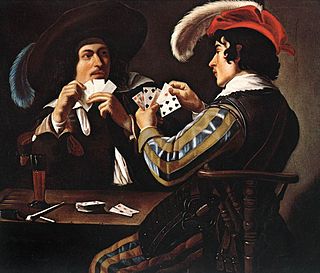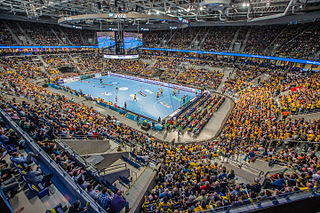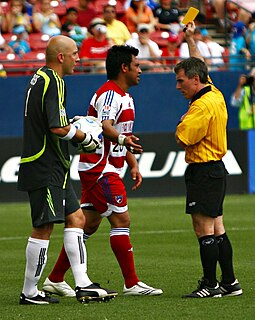| Look up green card in Wiktionary, the free dictionary. |
Green card may refer to:
| Look up green card in Wiktionary, the free dictionary. |
Green card may refer to:
| This disambiguation page lists articles associated with the title Green card. If an internal link led you here, you may wish to change the link to point directly to the intended article. |

A card game is any game using playing cards as the primary device with which the game is played, be they traditional or game-specific.

Field hockey is a widely played team sport of the hockey family. The game can be played on grass, watered turf, artificial turf or synthetic field, as well as an indoor boarded surface. Each team plays with ten field players and a goalkeeper. Players use sticks made of wood, carbon fibre, fibre glass, or a combination of carbon fibre and fibre glass in different quantities, to hit a round, hard, plastic hockey ball. The length of the hockey stick is based on the player's individual height: the top of the stick usually comes to the players hip, and taller players typically have longer sticks. The sticks have a round side and a flat side, and only the flat face of the stick is allowed to be used. Use of the other side results in a foul. Goalies often have a different design of stick, although they can also use an ordinary field hockey stick. The specific goal-keeping sticks have another curve at the end of the stick, which is to give it more surface area to block the ball. The uniform consists of shin guards, shoes, shorts or a skirt, a mouthguard and a jersey.

The Green Bay Packers are a professional American football team based in Green Bay, Wisconsin. The Packers compete in the National Football League (NFL) as a member club of the National Football Conference (NFC) North division. It is the third-oldest franchise in the NFL, dating back to 1919, and is the only non-profit, community-owned major league professional sports team based in the United States. Home games have been played at Lambeau Field since 1957.

Handball is a team sport in which two teams of seven players each pass a ball using their hands with the aim of throwing it into the goal of the other team. A standard match consists of two periods of 30 minutes, and the team that scores more goals wins.
"Power play" is a sporting term used to describe a period of play where one team has a numerical advantage in players usually due to a rule violation by the opposing team.

A penalty in ice hockey is a punishment for an infringement of the rules. Most penalties are enforced by sending the offending player to a penalty box for a set number of minutes. During the penalty the player may not participate in play. Penalties are called and enforced by the referee, or in some cases, the linesman. The offending team may not replace the player on the ice, leaving them short-handed as opposed to full strength. When the opposing team is said to be on a power play, they will have one more player on the ice than the short-handed team. The short-handed team is said to be "on the penalty kill" until the penalty expires and the penalized player returns to play. While standards vary somewhat between leagues, most leagues recognize several common varieties of penalties, as well as common infractions.
Yellow card may refer to:
Law 41 of the Laws of Cricket covers unfair play. This law has developed and expanded over time as various incidents of real life unfair play have been legislated against.

The National Football League (NFL) playoffs are a single-elimination tournament held after the regular season to determine the NFL champion. Seven teams from each of the league's two conferences qualify for the playoffs. A tie-breaking procedure exists if required. The tournament culminates in the Super Bowl: the league's championship game in which two teams, one from each conference, play each other to become world champion.

In sports, an ejection is the removal of a participant from a contest due to a violation of the sport's rules. The exact violations that lead to an ejection vary depending upon the sport, but common causes for ejection include unsportsmanlike conduct, violent acts against another participant that are beyond the sport's generally accepted standards for such acts, abuse against officials, violations of the sport's rules that the contest official deems to be egregious, or the use of an illegal substance to better a player's game. Most sports have provisions that allow players to be ejected, and many allow for the ejection of coaches, managers, or other non-playing personnel.
The 2004 NFL season was the 85th regular season of the National Football League.

The 1994 NFL season was the 75th regular season of the National Football League. To honor the NFL's 75th season, a special anniversary logo was designed and each player wore a patch on their jerseys with this logo throughout the season. Also, a selection committee of media and league personnel named a special NFL 75th Anniversary All-Time Team, honoring the best NFL players from the first 75 seasons.

In the sport of association football, fouls and misconduct are acts committed by players which are deemed by the referee to be unfair and are subsequently penalised. An offence may be a foul, misconduct or both depending on the nature of the offence and the circumstances in which it occurs. Fouls and misconduct are addressed in Law 12 of the Laws of the Game.

Penalty cards are used in many sports as a means of warning, reprimanding or penalising a player, coach or team official. Penalty cards are most commonly used by referees or umpires to indicate that a player has committed an offence. The official will hold the card above his or her head while looking or pointing towards the player that has committed the offence. This action makes the decision clear to all players, as well as spectators and other officials in a manner that is language-neutral. The colour or shape of the card used by the official indicates the type or seriousness of the offence and the level of punishment that is to be applied. Yellow and red cards are the most common, typically indicating, respectively, cautions and dismissals.

Unsportsmanlike conduct is a foul or offense in many sports that violates the sport's generally accepted rules of sportsmanship and participant conduct. Examples include verbal abuse or taunting of an opponent, an excessive celebration following a scoring play, or feigning injury. The official rules of many sports include a general provision whereby participants or an entire team may be penalized or otherwise sanctioned for unsportsmanlike conduct.
The Laws of Duplicate Bridge is the official rule book of duplicate bridge promulgated by the World Bridge Federation (WBF). The first Laws of Duplicate Contract Bridge were published in 1928. They were revised in 1933, 1935, 1943, 1949, 1963, 1975, 1987, 1997, 2007 and 2017. The Laws are effective worldwide for all duplicate bridge tournaments sponsored by WBF, zonal, national and subordinate organizations.

In gridiron football, a penalty is a sanction called against a team for a violation of the rules, called a foul. Officials initially signal penalties by tossing a bright yellow or orange colored penalty flag onto the field toward or at the spot of a foul. Many penalties result in moving the football toward the offending team's end zone, usually either 5, 10, or 15 yards, depending on the penalty. Most penalties against the defensive team also result in giving the offense an automatic first down, while a few penalties against the offensive team cause them to automatically lose a down. In some cases, depending on the spot of the foul, the ball is moved half the distance to the goal line rather than the usual number of yards, or the defense scores an automatic safety.
The 1972 LPGA Tour was the 23rd season since the LPGA Tour officially began in 1950. The season ran from January 5 to November 5. The season consisted of 29 official money events. Kathy Whitworth won the most tournaments, five. Whitworth led the money list with earnings of $65,063.

Karate at the Summer Olympics will make its debut at the 2020 Games in Tokyo, Japan.

Rödskägg ("Redbeard") also called Fem Opp, is a Swedish card game for three to seven players in which penalties are incurred for failing to follow certain rituals as well as for failing to take a declared number of tricks. Some rules describe Fem Opp as a variant of Rödskägg. It is an advanced and tactically demanding game and, of games played in Sweden, only Bridge and Poker are considered more difficult.